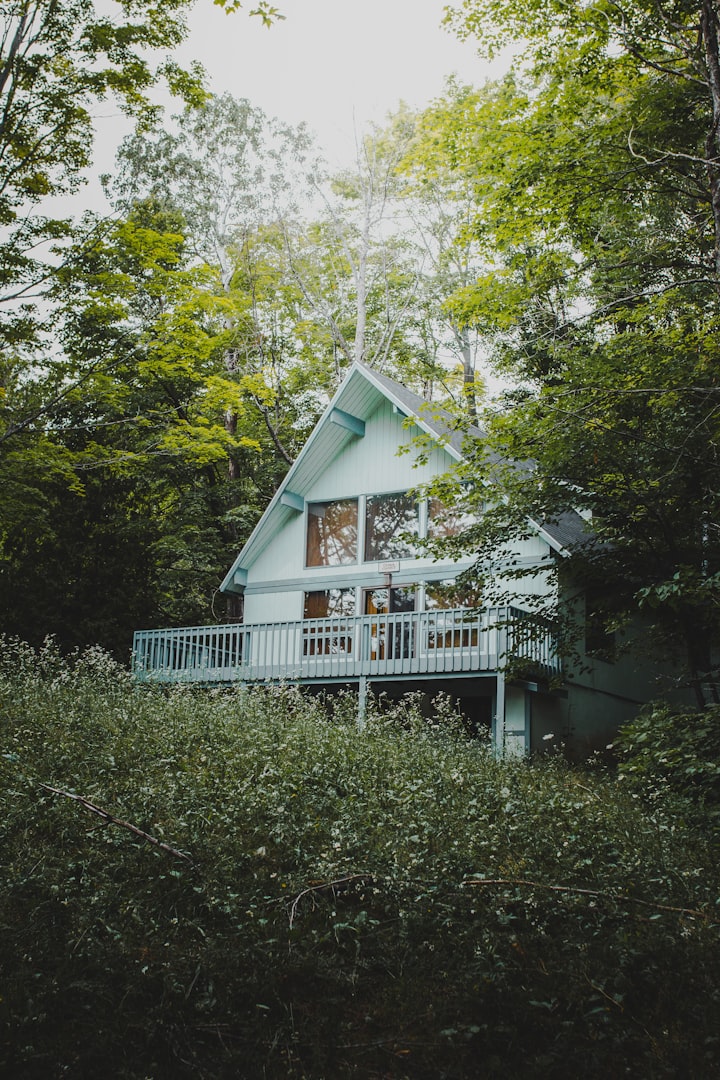She didn’t like the house. She decided it right then and there as she unloaded plates, carefully unwrapping each one, and stacking them on a low shelf.
They had known, when they said yes to the house, that it wasn’t exactly what they wanted. Not by a long shot. “We don’t mind ugly!” They had told their real estate agent. She was rueful, remembering this, because obviously—now it was obvious—she did mind ugly. Ugly was not beautiful waiting to be dusted off. Ugly was just…ugly. Ugly was brown lacquer and loose drawer handles. “We just need enough space for everyone,” they had said, “and a yard.”
They had outgrown their apartment and were exhausted, navigating city life with young kids, so they had decided to move back to her hometown, downshift, trade farmer’s markets for actual farms. They could always return, they told themselves, if it turned out they didn’t like it. This was a convenient lie they had repeated in order to wrench themselves out of the life they loved and into…this one. It had seemed worth it, at the time.
She lined up their coffee mugs, pulling her favorites to the front. The one that read, “Today Is Going to be a Good Day.” The one with the picture of the chicken. The one that read, “Homeschool Fuel,” from when all the schools were first shut down. The sight of them cheered her. They would just have to fit themselves in here, she resolved. Like these mugs all in a row.
There was noise from above and one by one, three children rumbled down the stairs. She greeted them, beaming. Good morning! Did they dream? Yes they could have water. Yes there was milk. She just needed to find their favorite bowl, the spoons that look like tractors…. She was happy for the raucous normalcy of a morning. Soon her husband joined them, freshly showered. She tried not to be resentful. His daily shower, even when the place was in shambles. They were trying to be sweet to one another, but lately when their eyes met there was something unspoken. What was it? Exhaustion, probably. Fear. She wanted him to reach out and pull her in close. Squeeze her like he was trying to make her into a new shape. But instead, he kissed her softly, quickly, and made his way toward the coffee.
She rode the wave of the morning. Big kids were sent downstairs to their makeshift classroom, next to the office where her husband now spent his days. She weaved in out of boredom and delight with the baby as she feigned interest in block stacking and made the necessary repetitions. What does a cow say? Moo! What does a chicken say? Bawk bawk! Until finally it was naptime. Blessed, glorious naptime.
Alone, she walked up the creaking steps to their new bedroom, going slow so as to dampen the noise. She made a mental note. The stairs would have to be fixed, but for now they would live with it. As they would have to live with the entire list of what ought to change. Because they had spent their money, every last cent, on this house which she was now certain was terrible.
The bedroom was pleasant enough, spacious, and contained a closet that had been noted on the real estate listing as “master walk-in.” She smirked as she unloaded armfuls of hanging shirts. “Walk-in” was generous.
She looped hangers over the metal rods, enjoying the rhythmic click as she did. There were a few shelves for pants, not much more. She ran her hands around the full-length mirror that took up most of one wall, wondering if it might be removed, replaced ultimately with something more practical, when she felt it. A little latch on one side that connected mirror to wall. She tugged, and the mirror swung wide. Behind it were several cubbies, each just the right size for a pair of shoes. It was the first welcome surprise the house had offered up, and she gasped, thrilled at the discovery. Above the cubbies were several thin shelves, barely tall enough for a few well-folded shirts. And had she not reached in a curious hand, she would have missed it, there in the dark on the highest shelf: a small black notebook.
She sat herself on the carpet and let the little book flop open in her lap. The handwriting was neat, but effortless. As if the writer had never known hurry. It was filled with dates and accomplishments. A record of childhood. In the early pages, every line was filled: first smile, first burp, first bath, and then the records grew more monumental and less frequent: first steps, first joke, first morning putting on his own clothes. She paged through it, entranced by the neatly uncomplicated window she had just discovered, into another family’s life. There were four kids tracked here, their milestones overlapping and bumping. Just as she imagined they must have overlapped and bumped into one another in the rooms of this house, just as her children one day would.
She was breathless by the time she found herself at the bottom of the stairs. Her husband looked up from his computer, headphones on.
“I’m going for a walk.” She handed him the baby monitor.
He took it, reluctant. “Where are you--?”
But she was already halfway up again. “I won’t be long!” She called back, and opened the front door lightly, so as not to wake the baby.
She knew where the previous owners now lived. Their real estate agent had pointed it out on one of their many visits to their future home. “They wanted to downsize,” she explained as they drove through the sleepy neighborhood, “They’ve got grown kids. Didn’t need the headache.” This “downsize” was a small yellow house, set back from the road. A pert solid fence surrounded it. There was a wooden gate and a little archway with a handmade sign that read: No solicitation. Except for Girl Scout Cookies. It didn’t take long to get there. The little book bounced in her pocket against her thigh as she walked.
A petite older woman opened the door, clumsily pulling a mask over her ears as she did. Edith, she remembered the old woman’s name was Edith and she said it, like a greeting, as she extended her hand.
“I’m sorry, have we met?” The woman, who was probably Edith, asked.
“Yes. No actually. I—we bought your house? Down the way?”
Edith clapped her hands together, delighted, and pushed the door wide. “Come in, won’t you? I’ve got the windows open. For ventilation.”
Normally she would have demurred, asked to stay outside on the steps, but she was starved for contact, for something that felt social, so she reasoned it out. She wouldn’t stay long. And besides, she couldn’t let this sweet old woman freeze on her little porch.
Inside, the house was bright and perfectly kept. There was color, and more art than she expected. In a corner a small wooden table sat stacked with books. There was a lamp with a stained-glass shade, and an ottoman, covered with a sheep’s wool rug. A cup of coffee sat on the table near the books, still steaming.
“I’m sorry to just barge in—”
“Don’t think of it! I’m happy you’re here.” Edith smiled and perched herself on a distant chair, awaiting the purpose of the visitation.
She pulled the book out of her pocket and walked it over, leaving it on the cushion of the chair Edith occupied. It took a moment and then, recognition.
“Oh my.” Tears welled in Edith’s eyes as she picked it up. “I was certain this was lost.” She thumbed through it, her face shining. “I raised all four of my boys in that house.” She pulled the book close to her chest and looked up, “Do you have kids?”
“Yes. Three.”
“Oh goodness, how wonderful!” Edith beamed. “How old are they?”
“Eight, Five and 18 months.”
“A blessing!” Edith shook her head, remembering how it was to have children that age. “Are you liking the house?”
She nodded, chewing her bottom lip. “It has a lot of space. We’re grateful we found it.” She wished she could say more.
Edith nodded. “There’s work to be done, I know. Al, my husband, he had plans to do it…” Edith trailed off. For a moment the two women just sat, in companionable quiet and then, as if she could span the distance between them, Edith leaned forward in her chair. “I owe you an apology,” She said.
“Me? Why?”
“You paid too much for that house. I knew it at the time, but I didn’t say anything. My son, he handled the sale. Al had recently passed and I just…I couldn’t do it. My son said the market would ‘bear it.’ That city folk were moving out here in droves. Sick of holing up in tiny apartments. And they could afford it. But then I found myself wondering if you had children, if you were a young family…the way we were when we bought that house so many years ago and…I’m sorry. I didn’t need the extra $20,000. I should have said something.”
She could feel Edith watching her. She noticed for the first time how nice it smelled in the little yellow house. She wished, suddenly, that they could just be people again, naked-faced. She wished Edith could sit next to her, put a hand on her knee. She felt her cheeks start to get hot. Oh no, she thought, not now.
She rested her eyes on the little black book, willing herself to keep it in, whatever was bubbling to the surface. And as she looked she felt a dull fury rise up. She contemplated taking the book, running for the door. How easy a life looked, in bullet points, and how cruel it suddenly seemed to pretend it could ever be so simple.
From her chair Edith watched, quietly, waiting. For a moment, a flicker of recognition lit her face, then vanished.
In the aftermath, Edith got shakily to her feet and excused herself to another room. When she returned she held out three lollipops, “for the little ones,” she said. And with gloved hands she slipped the treats into her guest’s coat pocket, who was standing now, waiting to be set free, and patted her gently on the hip several times, a gesture of comfort in a moment when gestures were everything.
“It will work out,” Edith said, eyes twinkling, “things are always finding a way to work out.”
Back in the morning air she felt her breath return. Remnants of an earlier mist hung above the houses. She heard birdsong from a distant perch. Missing the weight of the book in her pocket she reached a hand in, hoping to warm her fingers. But instead of fabric, they brushed a piece of paper, neatly folded. She pulled it out and then froze, mid-stride. The cold pressed in on all sides as she stared down at the check in her hands. It was made out to her, in the amount of $20,000. The memo line read simply, “Make it yours.”
She ought to turn around, run back to the little yellow house. Say something. Hug her. But there wasn’t time. She was needed. She refolded the check, and placed it carefully, back in her pocket. Then she pulled her jacket more tightly around herself and picked up the pace. Headed home.







Comments
There are no comments for this story
Be the first to respond and start the conversation.